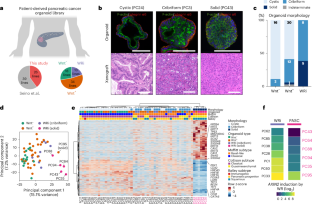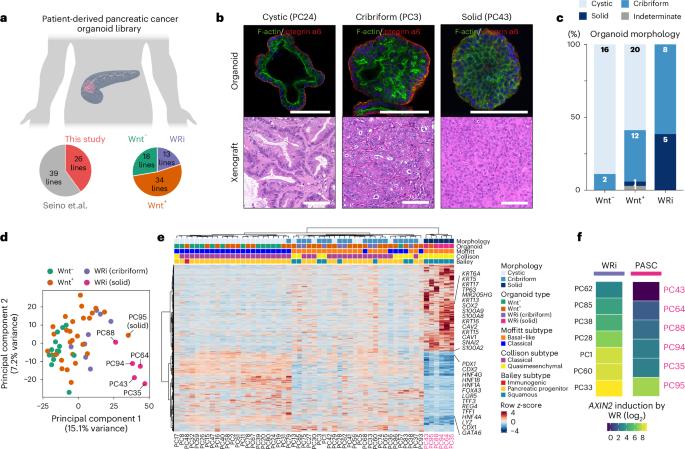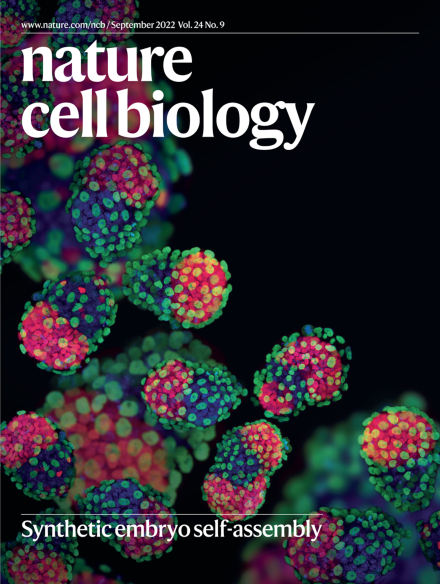Wnt缺陷和缺氧环境协调人类胰腺导管腺癌的鳞状重塑
IF 19.1
1区 生物学
Q1 CELL BIOLOGY
引用次数: 0
摘要
人类胰腺癌的特点是分子多样性,包括原生导管样和鳞状细胞样特征,但鳞状细胞转分化的内在机制仍然难以捉摸。为了全面了解人类胰腺癌的分子多样性,我们在此对 65 个患者来源的胰腺癌类器官系进行了分析,其中包括 6 个腺鳞癌系。H3K27me3介导的导管系谱标志物的清除和TP63驱动的鳞状细胞计划的劫持推动了鳞状细胞的形成,在Wnt缺乏的环境和缺氧条件下提供了生存益处。正常胰腺导管器官组织的基因工程发现,GATA6缺失和Wnt缺乏环境与遗传或缺氧介导的KDM6A失活共同促进了鳞状细胞重编程,进而增强了环境适应性。抑制 EZH2 可抵消表观遗传学偏倚,抑制腺鳞癌组织细胞的生长。我们的研究结果证明了对抗性微环境是如何决定人类胰腺癌的分子和组织学演变的,并为人类癌症谱系转换的原理和意义提供了见解。本文章由计算机程序翻译,如有差异,请以英文原文为准。


Wnt-deficient and hypoxic environment orchestrates squamous reprogramming of human pancreatic ductal adenocarcinoma
Human pancreatic cancer is characterized by the molecular diversity encompassing native duct-like and squamous cell-like identities, but mechanisms underlying squamous transdifferentiation have remained elusive. To comprehensively capture the molecular diversity of human pancreatic cancer, we here profiled 65 patient-derived pancreatic cancer organoid lines, including six adenosquamous carcinoma lines. H3K27me3-mediated erasure of the ductal lineage specifiers and hijacking of the TP63-driven squamous-cell programme drove squamous-cell commitment, providing survival benefit in a Wnt-deficient environment and hypoxic conditions. Gene engineering of normal pancreatic duct organoids revealed that GATA6 loss and a Wnt-deficient environment, in concert with genetic or hypoxia-mediated inactivation of KDM6A, facilitate squamous reprogramming, which in turn enhances environmental fitness. EZH2 inhibition counterbalanced the epigenetic bias and curbed the growth of adenosquamous cancer organoids. Our results demonstrate how an adversarial microenvironment dictates the molecular and histological evolution of human pancreatic cancer and provide insights into the principles and significance of lineage conversion in human cancer. Tamagawa, Fujii et al. demonstrate that squamous differentiation in human pancreatic cancer can be attributed to TP63-mediated lineage conversion and epigenetic reprogramming that depends upon a hypoxic and Wnt-defective niche.
求助全文
通过发布文献求助,成功后即可免费获取论文全文。
去求助
来源期刊

Nature Cell Biology
生物-细胞生物学
CiteScore
28.40
自引率
0.90%
发文量
219
审稿时长
3 months
期刊介绍:
Nature Cell Biology, a prestigious journal, upholds a commitment to publishing papers of the highest quality across all areas of cell biology, with a particular focus on elucidating mechanisms underlying fundamental cell biological processes. The journal's broad scope encompasses various areas of interest, including but not limited to:
-Autophagy
-Cancer biology
-Cell adhesion and migration
-Cell cycle and growth
-Cell death
-Chromatin and epigenetics
-Cytoskeletal dynamics
-Developmental biology
-DNA replication and repair
-Mechanisms of human disease
-Mechanobiology
-Membrane traffic and dynamics
-Metabolism
-Nuclear organization and dynamics
-Organelle biology
-Proteolysis and quality control
-RNA biology
-Signal transduction
-Stem cell biology
 求助内容:
求助内容: 应助结果提醒方式:
应助结果提醒方式:


